Premium Only Content
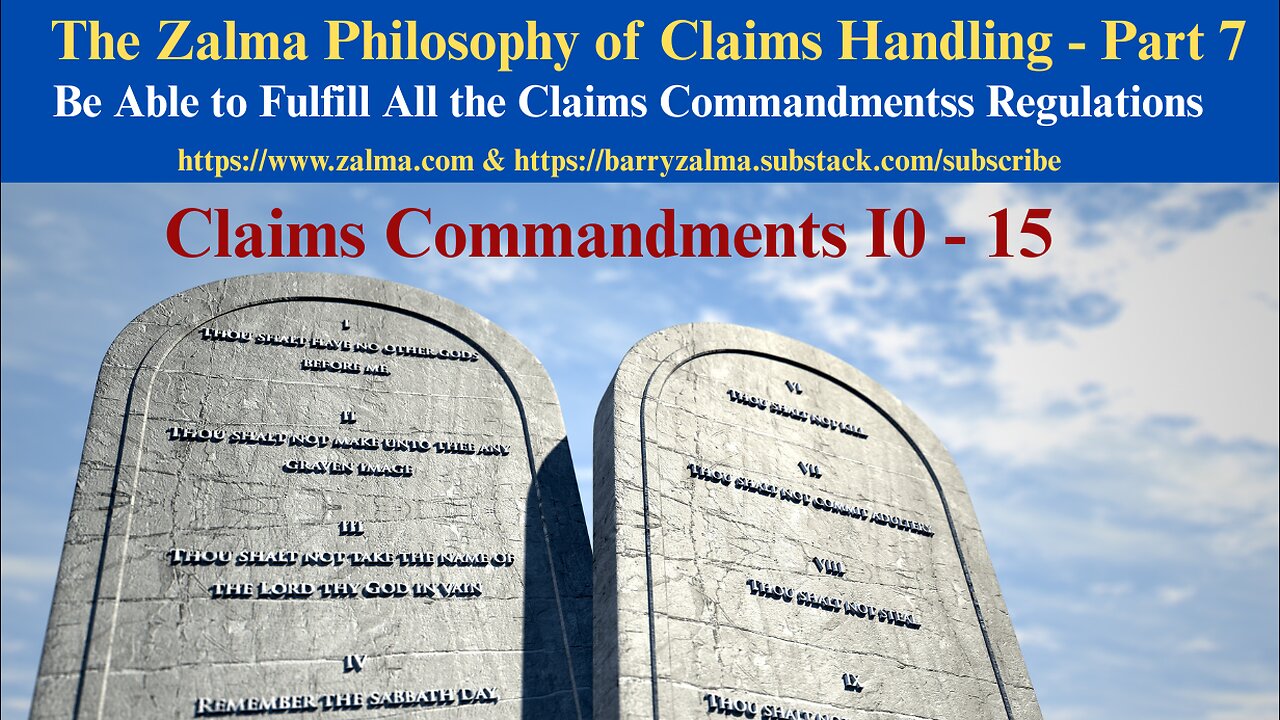
The Zalma Philosophy of Claims Handling - Part 8
The Professional Claims Handler
Post 5218
Claims Commandment X - Thou Shall Not Pretend to be a Lawyer
Some experienced and professional claims people know the law in their area of expertise better than most lawyers. Most claims people do not, nor are they capable of pretending, that they know the law.
Adjusters should be adjusters and leave lawyering to lawyers. Similarly, lawyers should be lawyers and never try to be adjusters.
Claims Commandment XI - Thou Shall Empathize With the Claimant
Everyone presenting a claim is unhappy, disturbed, shocked, injured and needs help. The adjuster appears to provide the needed help fairly and in good faith. The adjuster must recognize the difference between sympathy and empathy and that he or she will express empathy to the insured.
Empathy is identification with and understanding of another’s situation, feelings, and motives. It is the ability to understand another person’s circumstances, point of view, thoughts, and feelings.
Sympathy, on the other hand, is the sharing of another’s emotions, especially of sorrow or anguish and includes pity and compassion. It is the fact or power of sharing the feelings of another, especially in sorrow or trouble. Sympathy must be limited to the needs of relatives or clergy, not a professional claims relationship.
Those in the claims profession must always recognize that as a result of establishing an empathetic rapport with the insured and the claimant, the claims investigation will be completed with ease, the insured or claimant will assist the adjuster, and the claim will eventually be resolved with both the insurer and the insured satisfied with the result.
Claims Commandment XII - Thou Shall Stay With A Claim
Insurance is a personal service business. Although there is nothing in a policy of insurance that even mentions an insurance adjuster insurers found that they needed to help the people they insured to make it possible to resolve claims without animosity. The insurance adjuster is usually the only a person an insured has a personal contact with a representative of the insurer.
To properly serve the people the insurer insures require professional insurance claims handlers who are secure in their position and can spend the time necessary to assist an insured to resolve a claim even if that claim takes many months to resolve.
Claims Commandment XIII - Though Shall Educate Yourself Continuously
Insurance and the law of insurance is continuously changing. Acts that are considered bad faith today will be considered to be good faith tomorrow. Acts that are considered good faith today may be found to be bad faith tomorrow.
To be a professional claims handler it is essential that you understand the covenant of good faith and fair dealing, the basis of insurance, how insurance works, and a high level of skill in the profession and fulfill all of the continuing education requirements.
Claims Commandment XIV - Thou Shall Adjust
The claims handler has been called an “adjuster” for centuries because he or she is capable of adjusting to different situations. In modern practice an adjuster is: The person knowledgeable in insurance retained by an insurer for the purpose of assisting the insured in proving a loss to the insurer. A person who expresses to the insured the fidelity and good faith of the insurer.
It is the adjuster, and the help he or she gives the insured, which is the essence of the promise made by the insurer when the policy is issued.
Adjusting is accomplished when the adjuster and the insured trust each other and when the claim is paid the insured finds the amount agreed to is equal or better than the amount needed to repair or replace the property.
Claims Commandment XV - Thou Shall Not Be Cruel
Insurers pay to the satisfaction of all insureds and claimants approximately 95% of all claims presented. However, there will always be claims made on policies that do not provide coverage. They can be as simple as:
A fight in a bar with an all-inclusive assault and battery exclusion.
Earthquake damage to a house with no earthquake coverage.
A flood to a house with no flood insurance.
A landslide wipes away a house and lot where landslide is excluded.
An auto accident two days after the policy expires.
Vandalism damages to a car that is only covered by basic third party liability coverage.
A business that intentionally pollutes a nearby waterway.
An insured who attempts to defraud the insurer.
An insured who misrepresented or concealed material facts from the insurer when he, she or it applied for insurance.
An insured who misrepresented or concealed a material fact in the presentation of a claim.
It is essential that the adjuster deal with the claim denial in pleasant, empathetic and kind fashion. The adjuster should never be brusk and cruel. The adjuster should never take joy in denying a claim although it is the adjuster’s obligation to comply with the terms and conditions of the policy.
(c) 2025 Barry Zalma & ClaimSchool, Inc.
Please tell your friends and colleagues about this blog and the videos and let them subscribe to the blog and the videos.
Subscribe to my substack at https://barryzalma.substack.com/subscribe
Go to X @bzalma; Go to Barry Zalma videos at Rumble.com at https://rumble.com/account/content?type=all; Go to Barry Zalma on YouTube- https://www.youtube.com/channel/UCysiZklEtxZsSF9DfC0Expg; Go to the InsuranceClaims Library – https://lnkd.in/gwEYk.
-
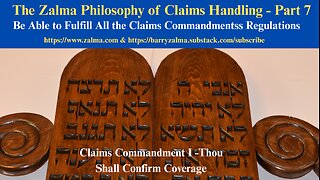 11:08
11:08
Insurance Law
3 days agoThe Zalma Philosophy of Claims Handling - Part 7
23 -
 1:25:03
1:25:03
Jeff Ahern
5 hours ago $16.99 earnedThe Saturday Show with Jeff Ahern
66.8K8 -
 1:31:56
1:31:56
Michael Franzese
20 hours agoWill NBA do anything about their Gambling Problems?
127K26 -
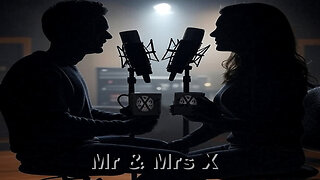 57:26
57:26
X22 Report
9 hours agoMr & Mrs X - The Food Industry Is Trying To Pull A Fast One On RFK Jr (MAHA), This Will Fail - EP 14
99.5K65 -
 2:01:08
2:01:08
LFA TV
1 day agoTHE RUMBLE RUNDOWN LIVE @9AM EST
157K14 -
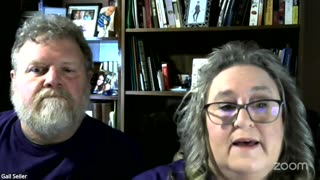 1:28:14
1:28:14
On Call with Dr. Mary Talley Bowden
8 hours agoI came for my wife.
33.2K34 -
 1:06:36
1:06:36
Wendy Bell Radio
13 hours agoPet Talk With The Pet Doc
75K36 -
 30:58
30:58
SouthernbelleReacts
3 days ago $9.39 earnedWe Didn’t Expect That Ending… ‘Welcome to Derry’ S1 E1 Reaction
50.8K12 -
 13:51
13:51
True Crime | Unsolved Cases | Mysterious Stories
5 days ago $20.84 earned7 Real Life Heroes Caught on Camera (Remastered Audio)
65K17 -
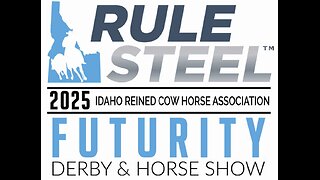 LIVE
LIVE
Total Horse Channel
19 hours ago2025 IRCHA Derby & Horse Show - November 1st
65 watching